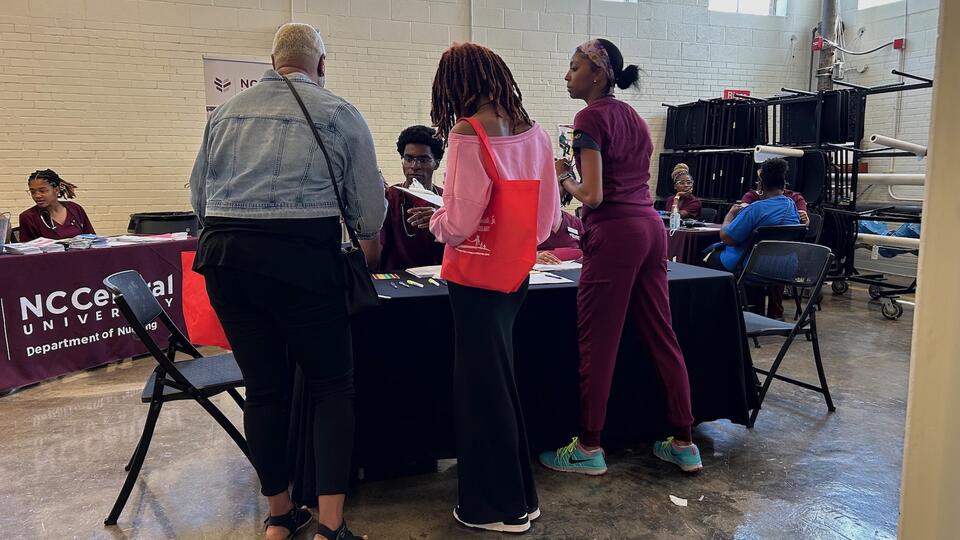Program Information
Disparities in health and health care in the US are widespread, severe and unacceptable. Men and women from minority groups continue to experience poor health outcomes compared to non-minority counterparts.
Disparities in health and health care in the US are widespread, severe and unacceptable. Men and women from minority groups continue to experience poor health outcomes compared to non-minority counterparts.

NCCU Advanced Center for COVID19 Related Disparities (ACCORD) will conduct multidisciplinary research to study the public health and economic impact of COVID19 on underserved communities of NC.

RCC aims to establish new resources and integrate with existing ones for health science research, to support three research projects in the current proposal and future health science projects, and to interact with area institutions and RCMI Translational Research Network (RTRN). RCC plans to enhance training workshops and equipment, document use of facilities, and to encourage basic scientists to do population science research and work closely with social/population-based scientists.

IDC aims to administer and employ a rigorous and competitive pilot project program to stimulate new health disparity research at NCCU, and to provide support for NCCU faculty to develop as biomedical/behavioral researchers.

CEC aims to institutionalize community-based research efforts across campus. Their multiple goals include educating the administration and staff on ‘what is community engaged research’, involve the administration, staff and faculty in community engagement/research, and to facilitate communication and NCCU ‘ownership’
Projects
Researchers
Awarded in Grants
Learn about the RCMI's External Advisory Committee, Internal Advisory Committee and Executive Committee.
Our team is made up of members from several departments and colleges within NCCU.
Research Projects
Anger and hostility are coping methods that AA males often employ in dealing with racist and unjust experiences while social support is often employed by women. Increased stress may result in physiological responses which in turn can lead to increased renal disease.
More African American (AA) women die from breast cancer (BrCa) compared to women from other ethnic groups. We hypothesize that cellular bioenergetics and inflammatory mediators may alter transcriptome regulation and cancer cell signaling, leading to disparities and poor prognosis.
Metabolic syndrome, driven mainly by obesity, has become a global epidemic, increasing the risk of type 2 diabetes and cardiovascular disease. We hypothesize that pregnane X receptor deficiency results in impaired adiponectin signaling leading to insulin resistance and glucose intolerance with more prominent race and sex differences.
Black women suffer disproportionately from breast cancer mortality, with social, environmental and biological causes. We propose to identify mechanisms by which metastatic breast carcinomas tend to be more common in Black women, focusing on cell-cell interactions between the cells that surround the tumor and the tumor itself. This research will provide a basis for developing new methods for targeting these aggressive breast cancers.
Black young adults are more likely to burdened by excess weight and face multiple disparities and negative health outcomes. The BeFAB-HBCU mHealth intervention is culturally-specific and tailored, to impact behavior, achieving healthy weight, and physical activity.
Research Pilot Projects
This pilot study sought to test the associations among work demands, daily hassles, depressive symptoms, and young, African American children’s behavior outcomes.
The primary purpose of this study was to understand the communication outcomes of African Americans who survived a right hemisphere stroke.

Metabolic dysfunctions such as hypercholesterolemia are leading causes of heart attacks in Americans, a rising health disparity.
Exposure to poor air quality is a public health concern. Minority communities may be at a higher risk and little is known about the different chemistry inducing pathological conditions.

Evidence has shown that individual factors such as racial identity may moderate the negative impact of racial discrimination on elevated blood pressure, leading to poor cardiovascular health.
Disparities in health outcomes and healthcare experienced by communities of color and by survivors of violence exist. We sought to know how in order to develop programs to improve collaboration with disadvantaged and marginalized communities.
